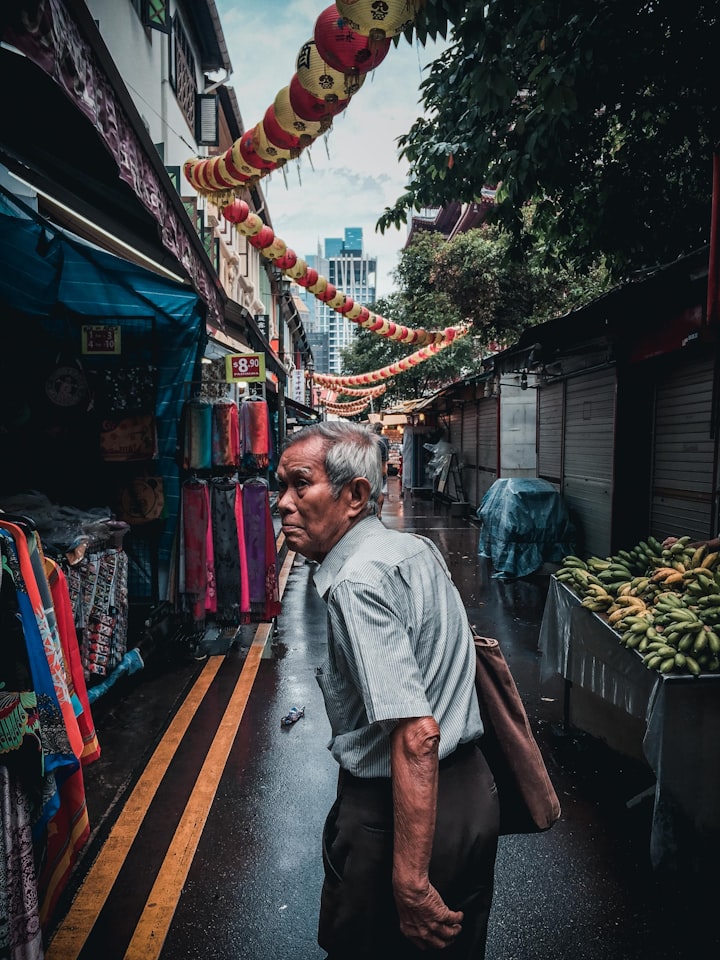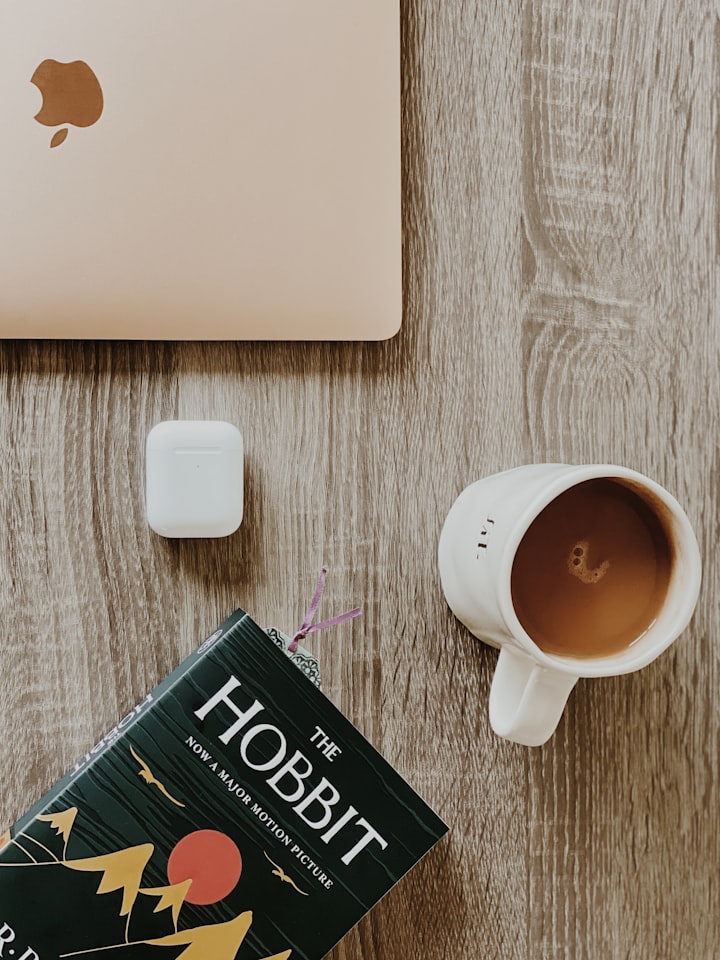Belanja
How far would you go to take care of someone you love?

Normally, I don’t go to the Fresh Taste supermarket in the Bugis MRT station complex. It’s too upmarket for us. Min and I usually shop at the small Golden Flower Chinese grocery where dried noodles are always on special for fifty cents. Budget people us, lah.
But I wanted to buy Min a few of the fresh peaches from China that she loves, rosy and sweetly fragrant, packed in white paper straw and clear plastic boxes so you can look carefully and make sure you pick ones that don’t have any bruises. Maybe I could tempt her to eat. Belanja means “give someone a treat” in Singlish and “shopping” in Malay. I’m the one who does both now.
Fresh Taste is premium: bright lights, soft music, well-groomed clerks in clean aprons, shelves and freezers filled with imported and prepared foods, carefully stacked mounds of perfect fruit and wide aisles with no boxes stacked up. It’s for the ABC Singaporeans* who like everything Western, work in the Bugis Tower offices and ride the MRT home to chic Newton, or a condo in green, leafy Tanglin, with bags full of French pate, Swiss chocolates and ready-to-heat risotto.
I queued up to pay. The Chinese man ahead of me was mid-40s, with a paunch that strained against his bright blue silk shirt and indicated plentiful meals of Hainanese chicken rice and chilli crab. He wore a suit and had gold rings on his fingers. He paid for his groceries with a credit card.
As he was putting his wallet away, I moved forward to put my basket down and opened the kitchen purse that held the household money. A twenty-dollar note fell out and the air-conditioning blew it to the floor by the man’s shoes. He bent down and picked up my money. I held out my hand, waiting for him to give it back to me.
The man looked at my outstretched hand, sneered and put the note into his pocket. “What's on the floor belongs to whoever finds it,” he said and walked out with his bags.
I looked at the middle-aged Malay woman at the register and she looked back at me, her eyes wide, shock and disbelief on her face.
“Such a bad one,” she said, shaking her head, “Some people crazy, lah.”
I left my basket and followed the man past the food stalls and cafes that fill the lower level of the complex. I needed that money back or we would be eating nothing but noodles all week.
Min complains about noodles, noodles, always noodles, and only eats a small amount. When I try to get her to eat more, she gets angry and throws down her chopsticks.
Like many working class Singaporeans, we know hard luck. There's just the two of us. I had to quit my part time job to care for Min. Rich city like Singapore, you'd think the healthcare would be free. Between bills and co-payments, our pensions just stretch to the end of the month. Even a sweet milky Kopi-C and raisin bun is a luxury now. No crazy rich Asians us, lah.
I could hear Dr. Yeoh’s voice again: ”She is losing weight, Mr. Wang, and her blood pressure is too high, even with the Lisinopril. She needs more care than you can give her on your own.”
Anxiety crept up my spine. I hurried after the man.
I briefly lost sight of the thief in a crowd of shoppers, but finally saw him at the lifts, impatiently jabbing at the down button. As I reached the elevator, the door was just closing but I pushed my way inside. The lift was crammed full of people with shopping bags and mobile phones in their hands, talking and laughing.
The man got out on the B1 parking level. I caught up with him as he reached a shiny, black Range Rover. He was parked in the handicapped zone next to the lifts and the stairs, but there wasn’t a disabled tag on his car. Such a bad one, lah.
“Eh, give me back my money!” I demanded, my hands clenched.
The man put his carry bags on the ground and fished keys out of his pocket. He didn’t even turn around. “You a bit fast ah, old man,” he said, opening the back of the car.
I could feel anger filling my chest. He was justifying his theft by calling me slow? The man looked like he'd never done a hard day’s work in his life. When I was his age, I was building the Mass Rapid Transit system and Singapore’s future.
“Eh, OK,” I said to the man’s back, my voice shaking, “What’s on the floor belongs to whoever finds it!”
I grabbed his two carry bags, one in each hand, and ran to the exit, pushing open the fire door. The bags were heavy. My arms strained but a lifetime of construction work had made me strong. I heard the man shout as the heavy door closed behind me. I ran raggedly up the staircase one level to the MRT station entrance and blended into the swarming throngs of shoppers and commuters. My heart was pounding. I looked over my shoulder but didn’t see the man anywhere.
I took the Green Line train one stop to Lavender Station. The escalator out of the station and the lift to our unit seemed to take forever. When I was safely inside our small flat, I let out my breath in a rush.
I heaved the bulky shopping bags onto the counter in our tiny kitchen and went to find Min. She sat in a chair in the living room, staring at the TV, curled in on herself like a snail.
There was a time when I always knew what Min was thinking. We'd been together so long that she would finish my sentences. She still laughed at my jokes, even if I had told them before. So many couples would grow apart after all that time, but we didn't. We were lucky. Until we stopped being lucky. The same day Dr. Yoeh told us that Min had dementia.
These days, the new Min sits for hours watching TV without seeming to see it. Sometimes, I have to repeat myself to get her attention. But when she smiles, or we laugh about a funny memory, the old Min looks back at me. I reach over and pat her arm and her smile deepens.
One day, she clung to my hand. "I'm scared. What will happen to me?” she asked, her eyes tearing.
I took a vow. “I will look after you, Min. I promise,” I had said, squeezing her hands. “Always us, two parts ...
"... one whole," she said, her face brightening. "Yes," she said, "I remember."
Now, I led her by the hand into the kitchen. Min stared at the white bags with the blue and green Fresh Taste logo.
I started pulling things out. There were two kilos of peeled shrimp, a kilo of Tasmanian salmon, one of sliced Spanish Iberico ham, two mini-wheels of triple-cream Brie cheese, a kilo of Italian cured salami. I took out two large cartons of yogurt, one vanilla and one mixed berries, a loaf of sourdough bread, strawberry jam and mayonnaise. A bottle of Chardonnay and two of red wine: a Coonawarra Shiraz and a Merlot. I chuckled. Chinese love Australian wines. There were blueberries, seedless red grapes, a mango … and peaches. A punnet of flat yellow peaches from Queensland.
I had never been able to buy so much food with only twenty dollars. For a moment, I felt a pang of guilt. Then I remembered the man’s Range Rover. A road certificate alone costs $40,000 dollars. He could spare a few bags of groceries. Besides, he took my money first.
Min spoke softly,“Wah, so much good food.” My heart lightened.
**
That week, we ate well and the kitchen purse sat almost untouched in a drawer. We were ABC Singaporeans. We had fresh fruit and yogurt for breakfast. I made ham, salami and cheese sandwiches for lunch. For dinner, I cooked the salmon or the shrimp and served it with take-away rice and vegetables ($3 before 5 pm) from the Kopitiam Food Court downstairs at the base of our block. We each had a small glass of wine. White until it was gone and then red. Min ate well, nodding and “hmm-hmming” as she chewed. I watched her with a lump in my throat, daring to hope. Min started to smile more often and she felt a little heavier as I helped her to the toilet at night.
**
By the end of the following week, the cheese, the ham, the shrimp and the salmon were finished.
I took Min for her appointment with Dr. Yeoh. The nurse wrote down Min’s weight and took her blood pressure. Her eyes widened. “Eh, Auntie* has put on weight and her BP is lower. The doctor will be pleased. What you doing?“
“New diet,” I said quickly.
"Keep doing it,” the nurse said, smiling.
The doctor nodded thoughtfully, “Looks like we don’t need to talk about finding a facility for her yet.”
I sent up a silent prayer of thanks to Song Jiang, the Chinese God of Thieves. He was definitely watching over us.
**
The next week, I went back to Fresh Taste. I had started an exercise program of stair training every morning in our residential building. I walked around the store for almost half an hour, with an empty basket, looking for a potential candidate. I didn’t know if luck would smile on me again, but I had to try. Too much at stake, lah. Besides, these ABC Singaporeans could afford it.
Finally, I saw him. He was Indian and heavy-set, about my age, with too-black dyed hair and a big belly, berating a store clerk for something being out of stock. The clerk didn’t stop pricing cans as he said, “Don’t know when it’s back in, sir.” The man glared at me as he walked past, saying, “I don’t know what is happening to service in this country,” and went to the registers. I followed and stood behind him in line as he checked out.
I waited until the man was putting away his bankcard before dropping a twenty-dollar note by his feet. He looked around to see if anyone else had noticed, bent awkwardly, scooped up the money, ignored me and walked out. I smiled slightly.
When I looked at the cashier, I realised it was the same woman from two weeks before.
“Bad luck it happened again, Uncle*," she said, but her eyes narrowed suspiciously as she looked at me. I would have to find other supermarkets to try.
Again, I left my basket and hurried after the man. I followed him in the lifts down to his car. The man ignored me and wouldn’t answer when I accused him of taking my money. I grabbed his shopping bags, took the fire exit and lost myself in the crowds near the MRT station.
When I got home, Min was seated at the small table in the kitchen. “What did you get this time, Jing?” she asked, a low current of excitement in her voice. My Min was back.
I unpacked the bags. The man was a vegetarian with a sweet tooth. There were meat-free Swedish meatballs and vegan fish sticks, roti prata, hummus, haloumi cheese, vintage cheddar, Greek yogurt, chia seeds, a pack of mixed dried fruit & nuts, muesli, chocolate bark with coconut and almond, coffee gelato and a bar of 70% dark chocolate. There was a rock melon, a small papaya, fresh figs, a punnet of bright red strawberries and a box of ripe maroon cherries from Australia, so dark they looked purple. I was checking to make sure the shopping bags were empty when my hand closed on a sack that crunched. I pulled out a kilo bag of dark-roasted imported espresso beans. Min and I would have good rich Italian coffee every morning for a month. No Kopi-C for us, lah!
**
When I took Min for her next appointment, the doctor was in a good mood. “Amazing how she has stabilised,” he said, “Usually, once Alzheimer’s reaches this stage…” He broke off.
The nurse checked Min’s weight and blood pressure and then patted her arm. “You have a good man here, Auntie. He is really looking after you.”
Min smiled a secret smile at me.
I knew I couldn’t return to the Bugis Fresh Taste for a while, but there are 40 other stores scattered around Singapore. Almost all of them are located at an MRT station. Stations I know like the back of my hand.
I wonder what Song Jiang will bring us this week.
*
Author's Notes: This story is based on an urban myth that was circulating around Singapore during the early days of the pandemic. Healthcare is not free in Singapore, although it is subsidized by the government. As in many other countries, many elderly people often don't have enough savings or pension to live comfortably and must still work part-time jobs.
*ABC Singaporeans - American Born Chinese, but in Singlish can also mean Singaporeans who are very Western in their tastes.
Eh, wah and lah are common expressions that Singaporeans use at the start or end of sentences for emphasis
*Older people in Singapore are called “Uncle” or “Auntie” as a sign of respect
About the Creator
Liz Sinclair
Amateur historian who loves travel and lives in Asia. I write 'what-if' historical stories, speculative fiction, travel essays and haiku.
Twitter: @LizinBali. LinkedIn: sinclairliz






Comments
There are no comments for this story
Be the first to respond and start the conversation.